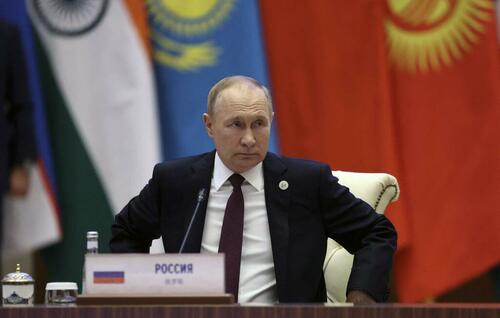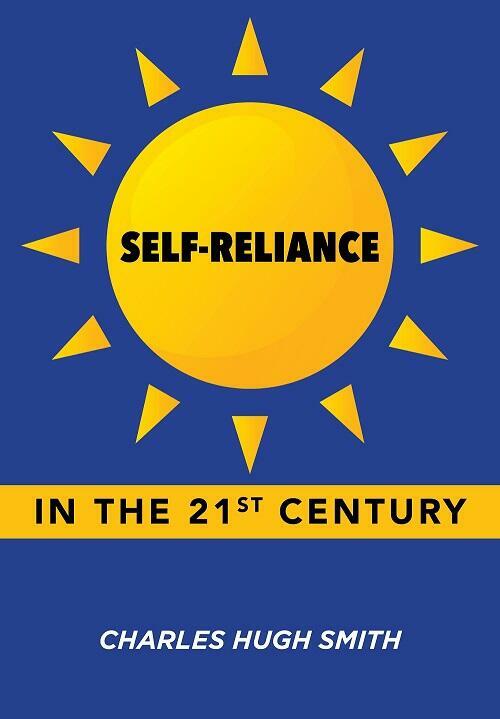The Golden Road To Samarkand
Authored by Tamir Tehari via The Gatestone Institute,
But what is it for? This is the question that the media in Russia, China, Iran and half a dozen countries were posing all last week in the wake of a summit in Samarkand that brought their leaders together as members or aspiring members of the Shanghai Cooperation Organisation (SCO).
The Russian media, echoing President Vladimir Putin’s speech at the summit, say the SCO is designed to end “the unipolar world “by creating a “multipolar system”.
The Chinese media offer a different version.
The SCO is meant to offer a new political system for the whole world as an alternative to the Western democratic model.
To the Islamic media in Tehran, celebrating the Islamic Republic’s admission to the club after 11 years of supplication, the SCO is an extension of the “Resistance Front” created to contain and defeat the American “Great Satan.”
A closer look, however, might show that the SCO is form without a clear content, an empty frame which different artists could project different fantasies.
The SCO was created in 1996 as the Shanghai Five bringing together China, Russia, Kyrgyzstan, Kazakhstan and Tajikistan together for two purposes:
-
Delineating China’s borders with Russia and the three ex-Soviet republics.
-
Fighting “Islamic terrorism” which affected China in East Turkestan (Xinjiang), Russia in Chechnya, and Tajikistan in Kulyab and Kyrgyzstan in the Fergana Valley.
A quarter of a century later, neither of those goals has been achieved.
Russia’s long border with China, which includes vast stretches of Chinese territory annexed by the Soviet Union in two border wars in the 1960s, remains undesignated. China has also failed to persuade Tajikistan to cede a chunk of land needed to widen the corridor Beijing has with Pakistan. (Beijing is now trying to ‘buy’ the Wakhan Corridor from Afghanistan for the same purpose.) Tajikistan and Kyrgyzstan also have failed to demarcate their borders. (The two neighbors fought a border war on the eve of the Samarkand summit.) At the same time, China has long maintained a claim on large chunks of Kazakhstan, which Russia annexed under the tsars.
Uzbekistan, another former Soviet republic, joined the group in 1997 to get help against terrorism led by the Islamic Liberation Party. But it, too, has complex irredentist problems with Tajikistan. In fact in ethnic and cultural terms, Samarkand, where the summit was held, is the largest Tajik city in the world. In exchange, the Kulyab area in Tajikistan has an Uzbek majority.
The SCO’s identity as a club of queer fellows has been further emphasized by the admission of a host of new members all of whom have territorial disputes with each other. India has fought two border wars with China, losing large chunks of territory in Ladakh and Kashmir. It has also had four wars with its Pakistani neighbor, losing a chunk of land in Ran-e-Kuch but succeeding in splitting Pakistan by creating Bangladesh.
To make the club even more queer, other nations with troubles of their own are lined up for membership. These include Azerbaijan and Armenia, currently at war against one another; Nepal, torn between India and China; Sri Lanka, where the very word Chinese provokes intense hatred; Turkey, which is fighting Russian surrogates in Libya and Syria; Belarus, which has become an extension of Putinistan; and Mongolia. which cannot swallow the Chinese occupation of Inner Mongolia. Perhaps the only would-be member of the club without such impediments is Cambodia.
Casting himself as the leader of a new “pole”, Putin has also spoken about inviting four Arab countries plus the Maldives to join the club.
Some Western commentators have dubbed the SCO “a new power bloc”. That may be jumping the gun a bit. SCO members are more dependent on trade with the European Union, the US, Canada, Japan, South Korea and Australia than with each other.
In 2020, exchanges within the SCO orbit accounted for less than 15 percent of their total foreign trade.
To be sure, that could change because offering huge discounts, Russia, currently the largest producer of oil and gas in the world, is making a big entry into the two largest markets for energy, China and India. But that is happening at the expense of Iran and Iraq, which are also losing their Turkish market to Russia.
In any case, this new trend could create a neo-colonial relationship in which Russia exports raw material to China and imports manufactured goods and business services.
But even then the alliance of which Putin dreams won’t be easy to shape because of deep cultural divides. Moscow has not forgotten the 1967 attack on its embassy in Beijing and over a decade of anti-Russian propaganda that followed. The fact that China’s President Xi Jinping refused to endorse Russia’s invasion of Ukraine punctured the balloon that Putin had hoped to float.
Putin had been careful not to mention Ukraine in Samarkand, in the hope that he could later claim to have received “full support” in private meetings with the leaders present.
That ploy failed when the Indian Prime Minister Narendra Modi shook a finger at Putin, saying “This war must end! This is no time for war!” Putin was forced to say he understood Modi’s “concerns”, and deceitfully promising to work for ending the war.
(An hour later, however, he told Russian TV that he didn’t care how long the war might last!)
It would be good news if the SCO succeeds in persuading its members to resolve their territorial disputes and bury their hatchets. Sadly, however, the various members of this strange club seem to be motivated by different, often contradictory and seldom the best, motives.
The Samarkand club represents some 40 percent of the world’s population and over 20 percent of the global GDP, not to mention four of the 9 nations with nuclear arsenals. Yet, it seems unlikely to become an anchor of stability in Eurasia; its members are more interested in petty schemes than grand ideas of peace and cooperation.
Their rhetoric reminds one of a character in James Elroy Flecker’s 19th century play “The Golden Road to Samarkand”, Ishak, a notorious black-marketeer, who tries to soft-soap the city’s gate-keepers into admitting his caravan with these lines:
“We travel not for trafficking alone;
By hotter winds our fiery hearts are fanned:
For lust of knowing what should not be known,
We take the Golden Road to Samarkand.”
Tyler Durden
Wed, 09/28/2022 – 21:40
via ZeroHedge News https://ift.tt/TLMAIKC Tyler Durden












